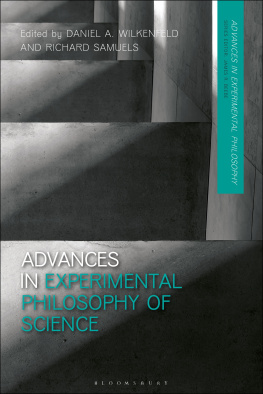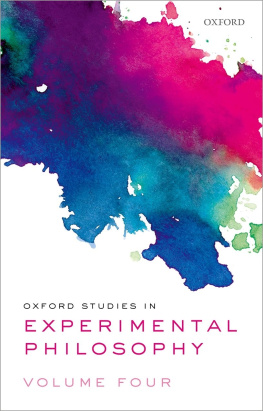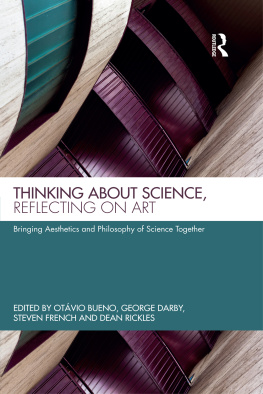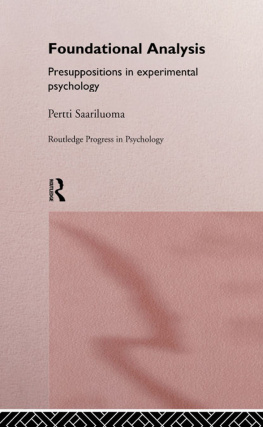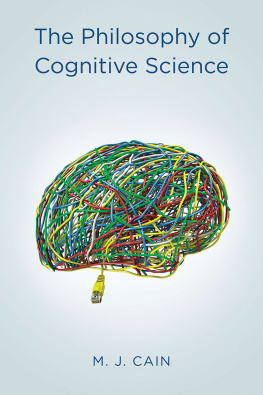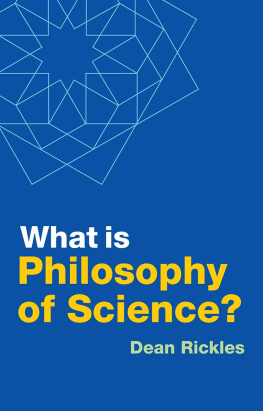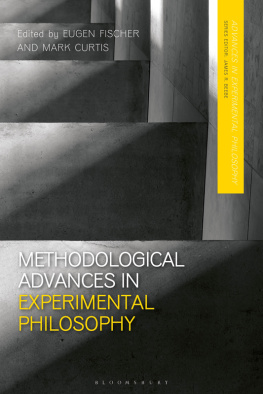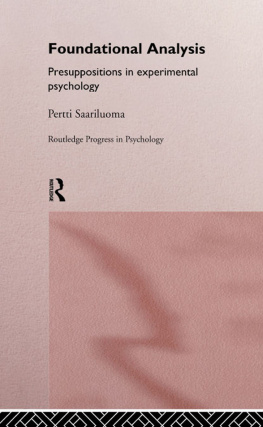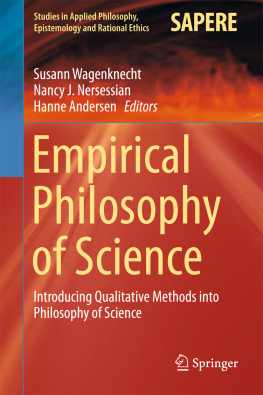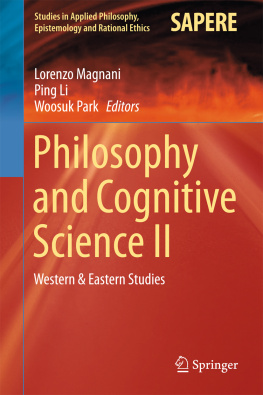Advances in Experimental Philosophy of Science
Advances in Experimental Philosophy
Series Editor
James Beebe, Associate Professor of Philosophy, University at Buffalo, USA
Editorial Board
Joshua Knobe, Yale University, USA
Edouard Machery, University of Pittsburgh, USA
Thomas Nadelhoffer, College of Charleston, USA
Eddy Nahmias, Neuroscience Institute at Georgia State University, USA
Jennifer Nagel, University of Toronto, Canada
Joshua Alexander, Siena College, USA
Empirical and experimental philosophy is generating tremendous excitement, producing unexpected results that are challenging traditional philosophical methods. Advances in Experimental Philosophy responds to this trend, bringing together some of the most exciting voices in the field to understand the approach and measure its impact in contemporary philosophy. The result is a series that captures past and present developments and anticipates future research directions.
To provide in-depth examinations, each volume links experimental philosophy to a key philosophical area. They provide historical overviews alongside case studies, reviews of current problems, and discussions of new directions. For upper-level undergraduates, postgraduates, and professionals actively pursuing research in experimental philosophy, these are essential resources.
Titles in the series include
Advances in Experimental Epistemology , edited by James R. Beebe
Advances in Experimental Moral Psychology , edited by Hagop Sarkissian and Jennifer Cole Wright
Advances in Experimental Philosophy and Philosophical Methodology , edited by Jennifer Nado
Advances in Experimental Philosophy of Aesthetics , edited by Florian Cova and Sbastien Rhault
Advances in Experimental Philosophy of Language , edited by Jussi Haukioja
Advances in Experimental Philosophy of Logic and Mathematics , edited by Andrew Aberdein and Matthew Inglis
Advances in Experimental Philosophy of Mind , edited by Justin Sytsma
Advances in Religion, Cognitive Science, and Experimental Philosophy , edited by Helen De Cruz and Ryan Nichols
Experimental Metaphysics , edited by David Rose
Methodological Advances in Experimental Philosophy , edited by Eugen Fischer and Mark Curtis
Advances in Experimental Philosophy of Science
Edited by
Daniel A. Wilkenfeld and Richard Samuels

Contents
Richard Samuels and Daniel Wilkenfeld
Introduction
It is hard to think of any human endeavor more transformative in its effects than science. In the space of a few hundred years, it has generated dramatic improvements in our understanding of the universe and spawned a plethora of new technologies. It pervades almost every aspect of contemporary human life: our education, our daily decisions, our politics, even our sports and pastimes. It lies at the heart of our purest intellectual activities and our unparalleled ability to control the world around us. If one were to list the most distinctive and important of human activities, science would surely be among them.
In view of this significance, it should be unsurprising that science itself has become an object of intensive enquiry. Thus, researchers from a broad array of different disciplinesincluding history, sociology, economics, psychology, and philosophyhave sought to understand various aspects of science. Further, over the past few decades, newly emerging interdisciplinary fields, such as science and technology studies (STS), have sought to integrate the deliverances of such research in pursuit of a more complete understanding of science.
Though a detailed discussion of these various fields of research falls well beyond the scope of the present chapter, we do need to say more about the philosophy of science and its potential interconnections with the cognitive and behavioral sciencesespecially psychology. Psychologists have long been interested in the sorts of cognitive activities central to scienceexplanation, reasoning, inductive learning, categorization, and concept formation, for example. Moreover, when psychologists study such phenomena, they typically deploy a standard battery of experimental methods. Similarly, philosophers of science have long been interested in questions about the nature of science, its practices, and its core concepts. And when philosophers of science address such issues, they too draw on their own battery of familiar methodsincluding, for example, the construction of arguments and counterexamples, the analysis of concepts, and, on occasion, the use of logics and formal models.
Strikinglyand this is the departure point for the present volumethere is remarkably little systematic interaction between the philosophy of science and the sorts of experimental approaches to be found in psychology. A core assumption of the present volume is that this lack of interaction presents an intriguing opportunity for growth. Philosophical and psychological approaches to the study of science should interact in deeper, more systematic ways than they currently do. This volume is thus dedicated to exploring the prospects for an experimental philosophy of scienceone that uses the empirical methods of psychology in order to help address questions in the philosophy of science.
Experimental philosophy and philosophy of science
The rarity with which experimental methods from psychology have been applied by philosophers of science is puzzling, given the recent impact of such methods on many other areas of philosophy. Epistemologists, for example, have become increasingly interested in experimentally investigating how such concepts as knowledge and justification are deployed in peoples explicit judgments (see, e.g., ).
Though there are many reasons for this experimental turn, one highly influential consideration, widely associated with the so-called positive program , is to aid in what has long been a core philosophical activitythe analysis of philosophically important concepts (make a substantial contribution to this project. In particular, they maintain that, by adopting this approach,
[t]hey can avoid some of the idiosyncrasies, biases, and performance errors that are likely to confront philosophers who attend only to their own intuitions and the intuitions of a few professional colleagues who read the same journals and who may have prior commitments to theories about the concepts under analysis. (, p. 23)
So construed, experimental philosophy might be viewed as an attempt to replace potentially idiosyncratic judgments with more thorough empirical research. Whats novel is that experimental philosophers propose that scientific standards ought to apply to philosophy as well. More specifically, they maintain that, to the extent that philosophical theories incur empirical commitments regarding peoples intuitions and other psychological states, philosophers should aspire to the same standards as scientists do.
Given the careful attention that philosophers of science have paid to experimental methodology, one might have expected to find them at the forefront of this new development in philosophy. However, for reasons that are not immediately obvious (at least not to us), philosophers of science have been slow to employ experimental methods of any sort. Moreover, what work has been done is isolated and scattered. Thus, the primary goal of this volume is to bring together research that both explores and exemplifies the prospects for an experimental philosophy of science.

